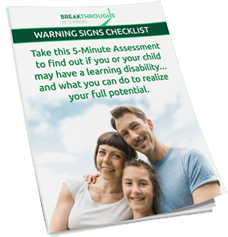
Does it affect life at home, at school or at work?
Take 5 minutes to complete the Warning Signs Checklist and discover whether you or your child could have learning difficulties that are impacting your life, and what to do about it.
Take The Free Warning Signs Checklist!
An educational assessment is the first step in determining the nature and extent of a learning disability. By asking a student to complete a series of tests involving brain skills, we can discover the source of a learning difficulty and design the correct program to help a student overcome it.
However, you don’t have to have a learning disability to get an educational assessment. Children that are gifted, or don’t have a learning disability but are still struggling in school can also benefit greatly from an educational assessment.
Results from an initial educational assessment not only identifies and aids in determining the best program to confront a learning disability, but taking another assessment during or at the conclusion of a program can also be illustrative. Learn more about this important step in taking the frustration out of learning and helping your child do well in school and ensure better functioning in adult life.
Educational assessments are used in many research and industrial capacities to measure skills, knowledge, attitudes and beliefs. When applied to non-learning disabled adults, they are often taken purely for the collection of data in psychological studies. Some industries also use them to survey their work force or use them in the hiring process.
When it comes to learning disabilities, or just children struggling in school, educational assessments are used to determine the area of brain weakness that makes learning difficult. These tests can include a variety of methods from paper to computer, but also include interactive hands-on elements as well, especially for younger children.
The assessments cover 12 to 27 mental skills including ten cognitive skills, six memory skills, four judgment skills, four problem solving skills, and four creative skills. There is also modality testing assessing whether a student prefers visual, auditory or kinesthetic learning.
For children up to Grade 3, the assessment is less demanding and measures 12 mental skills. Children attending Grade 3 to High School take assessments in all 27 mental skills.
These areas are measured on a scale and when standardized, assigned a number to indicate strength and weakness relative to children the same age.
The results of an educational assessment are used to design a personalized program to address a student’s areas of weakness. These programs are specialized to the individual and focus on teaching students to overcome their brain weaknesses by targeting and developing the specific areas of weakness. For example, a student who has shortcomings in auditory learning can develop their skills underlying listening and comprehending what they hears.
The results can also create program where a stronger skill is used to compliment the weaker skill. A student with a shortcoming in auditory may have strong skills in visual learning or reading. Using the visual or reading strength alongside the listening exercises by providing written or other visual material can assist with the development of those listening skills.
Periodically individual brain skills are retested. This allows an objective means of seeing progress and modifying to program to reflected the most up to date information.
We offer educational assessments to determine learning disabilities and can create programs to addresses those challenges. Apply for your free 1-on-1 consultation to learn more about our services and discover if our educational therapy programs are the key to your breakthrough.
Subscribe to our newsletter and receive regular articles and resources to help you or your child perform better at school, home or work.
suscribe now
Post Your Comment Below